|
|
|
Sort Order |
|
|
|
Items / Page
|
|
|
|
|
|
|
| Srl | Item |
| 1 |
ID:
122595
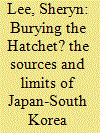

|
|
|
|
|
| Publication |
2013.
|
| Summary/Abstract |
This article critically evaluates the basis, aspirations, and prospects for bilateral security cooperation between Japan and South Korea. The assumption that common enemies, friends, and interests should have given rise to solid and steadily improving relations between Tokyo and Seoul has been far from realized. Rather, the Japan-ROK relationship continues to be marked by highly volatile behavior - ranging from intense friction to reluctant cooperation - which not only offers a vexing puzzle to the Realist school of international relations but also to the Constructivist one. This article argues that despite the perceived improvement in relations, Japan-South Korea security cooperation is situational and limited; recent developments do not imply a fundamental realignment of the two powers towards one another.
|
|
|
|
|
|
|
|
|
|
|
|
|
|
|
|
| 2 |
ID:
100659


|
|
|
| 3 |
ID:
124092


|
|
|
|
|
| Publication |
2013.
|
| Summary/Abstract |
In November 2010, the G20 Summit was held in Seoul. The G20 has increasingly replaced the G8 as being the premier forum for international economic cooperation, but in November 2010, it was the first time that a summit was held in country that was not a G8 member. It was by the Korean government seen as evidence of the country finally having achieved the goal of becoming an advanced nation playing, while still constrained by the division of the peninsula, a global role in line with its economic standing. The article argues that this has been a constant theme in Korea's foreign policy since it was originally formulated in 1994 as part of the country's globalization policy. This addition of an intentional dimension, to the objective capabilities created during the previous decades, has increasingly resulted in the type of behavior associated with middle power status.
|
|
|
|
|
|
|
|
|
|
|
|
|
|
|
|
| 4 |
ID:
112463
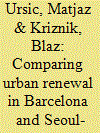

|
|
|
|
|
| Publication |
2012.
|
| Summary/Abstract |
Cities have become increasingly autonomous economic and political actors which actively respond to the pressures and opportunities of globalisation. Consequently, the urban management of any particular city is often based on the assumption that the city can improve its position against rival cities by efficiently managing its strategic resources and promoting its presumed advantages. Though such an approach to urban management may help cities to improve their global competitiveness and the quality of their residents' everyday life, it can sometimes result in negative consequences at the local level, thus actually narrowing the development prospects of the cities in the end. This article discusses urban management against the backdrop of the competitive urban policy in Barcelona and Seoul, and compares the local consequences of urban renewal in both cities. Based on a comparison of the two cases of urban renewal, 22@ Activity District in Barcelona and the Cheonggyecheon restoration in Seoul, this article argues that, in conditions of competition among global cities, even very different approaches to urban management and urban renewal may result in similar consequences at the local level.
|
|
|
|
|
|
|
|
|
|
|
|
|
|
|
|
| 5 |
ID:
115058
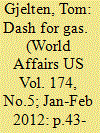

|
|
|
|
|
| Publication |
2012.
|
| Summary/Abstract |
For a fresh perspective on geopolitical trends, look at the world through the lens of the natural gas trade. One of the reasons for Israeli unease with the Arab Spring is that the democratic uprising that took down Hosni Mubarak also brought interruptions in Israel's supply of natural gas, much of which since 2008 has come from Egypt. Wondering about China's new interest in Australia and Qatar? It's about their abundant gas supplies and China's tremendous energy needs. Desperate for signs of cooperation from North Korea? Check out reports that Kim Jong-il may agree to the construction of a natural gas pipeline that would link Russia, Pyongyang, and Seoul. From Asia to the Middle East to North America, a boom in natural gas usage is rearranging international connections, with major repercussions for global politics.
|
|
|
|
|
|
|
|
|
|
|
|
|
|
|
|
| 6 |
ID:
111986
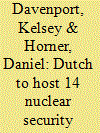

|
|
|
| 7 |
ID:
085918
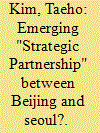

|
|
|
|
|
| Publication |
2008.
|
| Summary/Abstract |
In light of the extensive ties between Beijing and Seoul-now termed as a "strategic cooperative partnership"- as well as of the growing importance of China on peninsular and regional affairs, how would the China factor play out in South Korea's future security environment and in the evolving U.S-South Korean relationship?
|
|
|
|
|
|
|
|
|
|
|
|
|
|
|
|
| 8 |
ID:
109508


|
|
|
| 9 |
ID:
110993
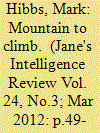

|
|
|
|
|
| Publication |
2012.
|
| Summary/Abstract |
The Second of its kind, the Seoul summit aims to reach consensus on security nuclear materials against their use by militants, however, despite some progress in 2010, agreeement may be harder to find this time.
|
|
|
|
|
|
|
|
|
|
|
|
|
|
|
|
| 10 |
ID:
111917
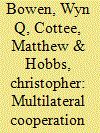

|
|
|
|
|
| Publication |
2012.
|
| Summary/Abstract |
The second Nuclear Security Summit on 26-27 March 2012 in Seoul provides an important opportunity to gauge international consensus on the threat posed by nuclear terrorism, and to evaluate progress in the development of multilateral cooperative efforts to prevent it. However, the 'nuclear security' agenda has long been complicated by the complexity of the issues it covers and diverging perceptions of the risks and threats in this area. Further complications involve the politics that have constrained the development of formal cooperative approaches and the patchwork nature of the existing multilateral policy architecture. While the Summit is unlikely to go very far in mitigating these complications, it will nonetheless provide impetus to multilateral efforts to strengthen the international regulative framework in this area and, in the process, to develop the norm of nuclear security. Beyond Seoul several priorities stand out. Nuclear safety and nuclear security need to be approached in a more balanced way by the International Atomic Energy Agency, and it must also be allowed to adopt a more joined-up, and less stove-piped, approach to nuclear governance across the safeguards, safety and security fields. Developing countries that are concerned by growing demands for strengthened nuclear security arrangements need greater reassurance from those proposing them that these will not undermine their rights under the Nuclear Non-Proliferation Treaty to pursue civil applications of nuclear energy. Greater progress also needs to be made in universalizing the key nuclear security conventions and their amendments, and attention should be given to how momentum and high-level political buy-in to the nuclear security agenda can be maintained in the future both as part of, and beyond, the Nuclear Security Summit process.
|
|
|
|
|
|
|
|
|
|
|
|
|
|
|
|
| 11 |
ID:
108555
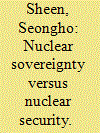

|
|
|
|
|
| Publication |
2011.
|
| Summary/Abstract |
South Korea is the world's sixth-largest nuclear energy producer, with 20 nuclear
power plants providing about 40 percent of its electricity. South Korea's nuclear
energy development has been made possible by the ROK-U.S. Atomic Energy
Agreement signed in 1972. The United States provided nuclear technologies and
materials necessary for the peaceful use of nuclear energy; in return, South Korea
was specifically prohibited from proliferation-related activities such as the reprocessing of spent fuel and uranium enrichment under the terms of the agreement.
After three decades of successful bilateral nuclear cooperation, the two governments are due to renew the accord by 2014. However, negotiations on the new
agreement between Seoul and Washington could potentially provide a source of
tension and controversy. In particular, South Korea's wish for a complete fuel-cycle
capability could directly conflict with President Obama's call for a nuclear weapons
free world and U.S. concerns about nuclear proliferation. The bilateral negotiation
between the United States and the ROK will have important implications for the
global non-proliferation regime and regional security as well. This paper identifies
issues and challenges regarding the renewal of the ROK-U.S. Atomic Energy
Agreement and discusses the associated policy implications for the ROK-U.S.
alliance.
|
|
|
|
|
|
|
|
|
|
|
|
|
|
|
|
| 12 |
ID:
108528
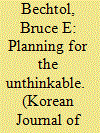

|
|
|
|
|
| Publication |
2011.
|
| Summary/Abstract |
North Korea has shown no willingness to give up its nuclear weaponization programs. In fact, Pyongyang has gone out of its way to keep essential elements of its
nuclear programs hidden unless it was in the DPRK's interest to publicly display
them. With the increase in tensions initiated by North Korea in recent years this is
particularly disturbing. A review of North Korea's nuclear weapons capabilities
reveals a two-track agenda consisting of both a plutonium (proven) and a highly
enriched uranium (likely) program. Scenarios involving both of these programs
show that North Korea-despite rather primitive capabilities-can deliver a nuclear
weapon that would cause casualties in the tens of thousands. While a preemptive
strike may seem like the obvious answer to a nuclear attack, North Korea's ability
to strike back with non-nuclear forces would likely mean a full-scale conflict possibly involving hundreds of thousands of casualties. Consequence management
for a nuclear attack would be unable to prevent second- and third-order effects
that could last as long as a generation. High-level officials in Washington and
Seoul have placed renewed focus on planning for nuclear scenarios on the Korean
peninsula-but the bottom line is that preventing and deterring a North Korean
nuclear attack must be a high priority.
|
|
|
|
|
|
|
|
|
|
|
|
|
|
|
|
| 13 |
ID:
157602
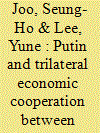

|
|
|
|
|
| Summary/Abstract |
Since 2000, President Vladimir Putin of Russia has persistently pushed for trilateral economic projects involving Moscow, Seoul, and Pyongyang, especially in the fields of energy (oil, gas, and electricity) and transportation (railroad). The Kremlin has long maintained that its proposed trilateral projects would not only be economically beneficial to all but also pave the road to inter-Korean reconciliation and peaceful unification. This article addresses three questions regarding Putin’s trilateral economic projects. What motivates Russia to push for the projects? Would they bring benefits to the three countries? Would they facilitate Korean peace process? The authors argue that Putin’s trilateral economic projects are part of Russia’s quest for power and search for a multipolar world order and should be understood from the theoretical framework of “structural realism.” The research finds that the projects are not feasible due to North Korea’s nuclear crisis and economic uncertainties and may be implemented after the current North Korea’s nuclear crisis is resolved diplomatically, if North Korea’s leadership changes or if inter-Korean reconciliation and cooperation is achieved by the progressive government of Moon Jae-In.
|
|
|
|
|
|
|
|
|
|
|
|
|
|
|
|
| 14 |
ID:
154852
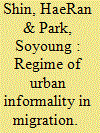

|
|
|
|
|
| Summary/Abstract |
This study looks at how a regime of urban informality has taken shape in a migrant receiving community in Seoul, South Korea. It investigates how actors from the public sector and the private sector came to help undocumented Chosŏnjok migrants stay in the Kuro/Taerim area of Seoul regardless of their legal status. We view such practices as a response to local changes provoked by shifts in the geopolitical environment and fluctuating national policies. Based on longitudinal fieldwork, including in-depth interviews, participant observation, and archival research the findings of this study are as follows. First, public-sector actors, including the Korea immigration service, local authorities, and local police, have shifted their roles from controlling to accommodating, being motivated by competition with other departments, promotion, and personal attachment. Second, the private sector has expanded its role, building on relations with Chosŏnjok as easygoing customers and service providers. This study contributes to the understanding of regimes of informal settlements and their spatial contexts.
|
|
|
|
|
|
|
|
|
|
|
|
|
|
|
|
| 15 |
ID:
115802
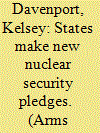

|
|
|
| 16 |
ID:
144229


|
|
|
|
|
| Summary/Abstract |
In the decade and a half following Korean liberation from Japan in 1945, a category of men prowled Seoul's back alleys and also its halls of power. These figures might be called street leaders, for they were directly linked on one hand to private agents of violence and on the other to the top state and political elites of the country. The most notorious individuals included Kim Tu-han, a gang leader who became an elected politician, and Yi Chŏng-jae, a ‘political gangster’ who helped party politicians with their dirty work. Street leaders like Kim and Yi were on the scene at key moments in the republic's early political development. An examination of the political careers of Kim and Yi reveals how important cooperation between such actors and elite politicians was to state-building, political mobilization, and design of electoral institutions—processes that created the contemporary South Korean polity. Both the alliances between politicians and street leaders as well as the destruction of those alliances left deep impressions on South Korean politics.
|
|
|
|
|
|
|
|
|
|
|
|
|
|
|
|
| 17 |
ID:
192145
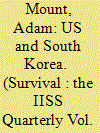

|
|
|
|
|
| Summary/Abstract |
As US officials have grown more anxious about the credibility of extended nuclear deterrence, they have placed renewed emphasis on nuclear-assurance measures. The hope is that closer exercises and consultations can reassure allies, strengthen deterrence postures and reduce the risk that an ally could pursue their own nuclear weapons. However, recent developments in the US–South Korea alliance suggest that nuclear assurance is not only ineffective at reassuring Seoul but may also be fuelling proliferation risks. By raising the salience of nuclear weapons within the alliance, nuclear assurance reinforces the fiction that South Korea’s defence depends on nuclear use. Misunderstanding the risks and potential of nuclear assurance has fuelled calls for a South Korean nuclear-weapons programme and obstructed the alliance’s ability to adapt and improve its deterrence posture.
|
|
|
|
|
|
|
|
|
|
|
|
|
|
|
|
| 18 |
ID:
165278
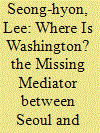

|
|
|
|
|
|
|
|